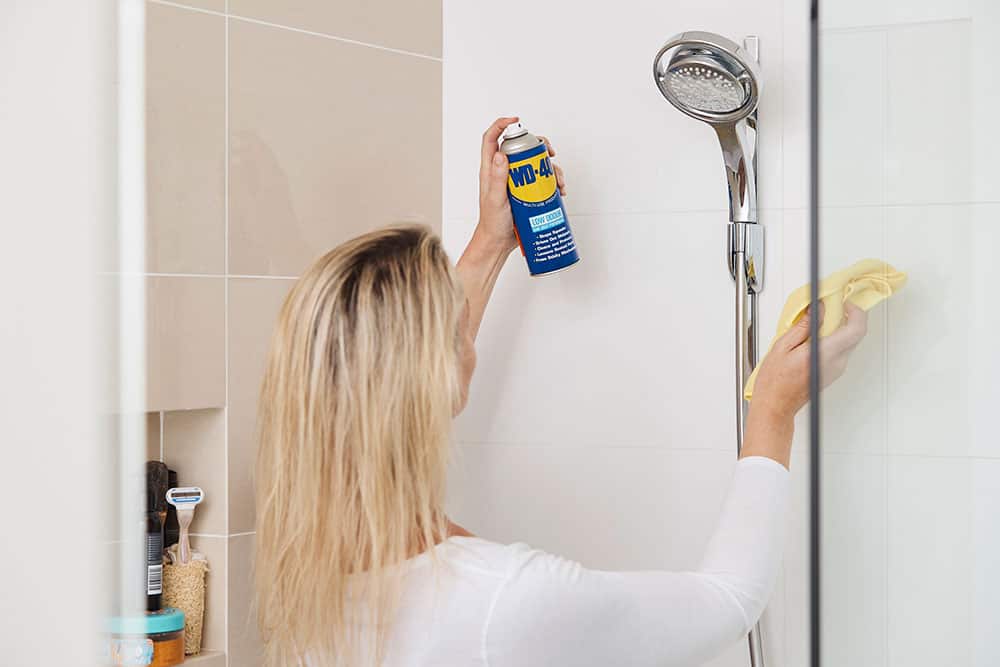
Understanding Hard Water Stains
Hard water stains on glass shower doors are a common nuisance, caused primarily by the presence of dissolved minerals such as calcium and magnesium in the water supply. These minerals leave behind stubborn deposits that can be challenging to remove without the proper knowledge and techniques.
Definition and Composition
Hard water stains are mineral deposits that accumulate on surfaces exposed to water with high mineral content. Calcium carbonate and magnesium carbonate are the primary minerals involved in the formation of these stains. Over time, as water evaporates, these minerals crystallize, leaving behind unsightly spots and streaks on glass surfaces.
Identifying Characteristics
Hard water stains typically appear as white or cloudy spots on glass shower doors. They can also manifest as a chalky residue with a gritty texture. These stains tend to concentrate in areas where water splashes frequently, such as around the edges and corners of the shower door.
Effective Cleaning Methods
When it comes to removing hard water stains from glass shower doors, several methods have proven to be effective.
Vinegar Solution
One of the most popular and cost-effective solutions for tackling hard water stains is using a vinegar solution. To prepare this solution, mix equal parts white vinegar and water in a spray bottle. Apply the solution generously to the affected areas and let it sit for several minutes before scrubbing with a non-abrasive sponge or brush. Vinegar’s acidic nature helps dissolve mineral deposits, making them easier to wipe away. However, vinegar may not be suitable for all types of glass and could cause etching over time if used excessively.
Lemon Juice and Baking Soda Paste
Another natural remedy for hard water stains involves creating a paste using lemon juice and baking soda. Mix equal parts lemon juice and baking soda to form a thick paste. Apply the paste to the stains and let it sit for about 15 minutes before scrubbing with a sponge or brush. The acidic properties of lemon juice combined with the abrasive texture of baking soda work together to break down and lift away stubborn mineral deposits. However, this method may require more effort compared to using commercial cleaners, and it’s essential to rinse the surface thoroughly after cleaning to prevent residue buildup.
Commercial Cleaners
For those seeking a more convenient solution, various commercial cleaners specifically formulated to tackle hard water stains are available on the market. These cleaners come in different forms, such as sprays, gels, or foams, and often contain powerful ingredients designed to dissolve mineral deposits effectively. When using commercial cleaners, always follow the manufacturer’s instructions carefully and ensure proper ventilation in the bathroom. Additionally, consider factors such as the type of glass and any potential health or environmental concerns before making a purchase.
Preventive Measures
While cleaning hard water stains is essential, taking preventive measures can help minimize their recurrence and prolong the clarity of glass shower doors.
Regular Maintenance
Establishing a consistent cleaning routine can help prevent hard water stains from becoming severe. Wiping down shower doors daily with a squeegee or microfiber cloth after each use can prevent water droplets from drying and leaving behind mineral deposits. Additionally, incorporating a weekly deep cleaning regimen using vinegar or lemon juice can help keep stains at bay.
Water Softening Systems
Installing a water softening system can effectively reduce the mineral content in the water supply, thereby preventing the formation of hard water stains. These systems typically utilize ion-exchange technology to replace calcium and magnesium ions with sodium ions, resulting in softer water that is less prone to leaving behind mineral deposits. While the initial cost and maintenance requirements of water softeners may seem daunting, the long-term benefits in terms of cleaner surfaces and extended appliance lifespan make them a worthwhile investment.
Protective Coatings
Applying a protective coating to glass shower doors can create a barrier that repels water and prevents mineral buildup. These coatings, often referred to as water repellents or sealants, are typically easy to apply and can provide long-lasting protection against hard water stains. However, it’s essential to follow the manufacturer’s instructions carefully during the application process to ensure proper adhesion and effectiveness. Additionally, keep in mind that protective coatings may require reapplication periodically to maintain their efficacy.
In conclusion, dealing with hard water stains on glass shower doors requires a combination of effective cleaning methods and preventive measures. By understanding the nature of hard water stains, choosing the right cleaning products and techniques, and implementing proactive strategies to minimize their recurrence, homeowners can enjoy crystal-clear shower doors free from unsightly mineral deposits.




